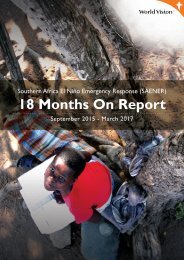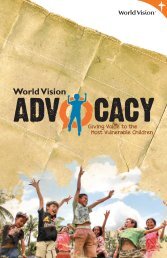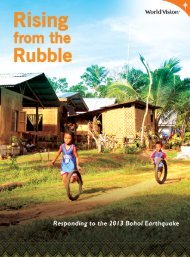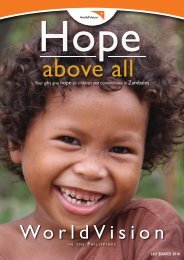INTER-AGENCY LIVELIHOOD ASSESSMENT - ARUA DISTRICT NORTHERN UGANDA GOAL
Create successful ePaper yourself
Turn your PDF publications into a flip-book with our unique Google optimized e-Paper software.
INFANT AND YOUNG CHILD FEEDING<br />
Breastfeeding has important implications for the health of both newborns and mothers. It’s also an<br />
ideal way of providing healthy food for optimal development and growth of infants with remarkable<br />
health benefits. The assessment revealed that 86% of refugee women and 82% of host community<br />
women exclusively breastfed immediately after delivery. Breastmilk plays a significant role in<br />
reducing infant mortality due to common illnesses such as diarrhoea or pneumonia.<br />
The study also found 3% of refugees and 9% of the host communities reported starting breastfeeding<br />
three days after delivery. On the other hand, 11% of refugees and 8% of the host communities never<br />
breastfed due to health related issues.<br />
Figure 31: Respondents Who Have Started Exclusive Breastfeeding After Delivery<br />
Figure 32: Duration of Exclusive Breast Feeding<br />
100%<br />
100%<br />
86% 82%<br />
3%<br />
80%<br />
60%<br />
80%<br />
60%<br />
81%<br />
68%<br />
40%<br />
40%<br />
20%<br />
0<br />
9%<br />
0% 1%<br />
11% 8%<br />
20%<br />
0<br />
24%<br />
15%<br />
2% 4% 3% 4%<br />
As seen from Figure 32 above, the majority of the respondents reported that the length of exclusive<br />
breastfeeding is from four months and more with 81% of refugees and 68% of the host communities<br />
continuing to breastfeed for more than six months. A small number, 15% of refugees and 24% of the<br />
host communities, reported the duration of breastfeeding between four to six months stopping due to<br />
work/household chores and some complaining about lack of adequate milk due to poor diet.<br />
Deworming<br />
Soil-transmitted helminthiasis is the most common parasitic worm that affects masses of children.<br />
The condition affects children’s ability to actively participate in their education. According to the<br />
World Health Organization (WHO), over 870 million children globally are at risk of parasitic worm<br />
infection.<br />
A significant number of survey respondents, 60% refugees and 43% of the host communities,<br />
reported not deworming their children. Worm infections interfere with nutrient uptake; can lead to<br />
anemia, malnourishment and impaired mental and physical development; and pose a serious threat to<br />
children’s health, education, and productivity.<br />
According to figure 30 below, 42% of refugees and 27% of the host communities reported that they<br />
are concerned about the nutritional status of their children and gave two major concerns: 94% of<br />
refugees said that their fear is malnourishment for their children since they feed the same kind of<br />
food every month. As well, 59% of the host communities reported that they are concerned about<br />
poverty making them unable to purchase food for their children.<br />
26<br />
<strong>INTER</strong>-<strong>AGENCY</strong> <strong>LIVELIHOOD</strong> <strong>ASSESSMENT</strong> TARGETING REFUGEES AND<br />
HOST COMMUNITIES IN MVEPI AND RHINO CAMP SETTLEMNTS










